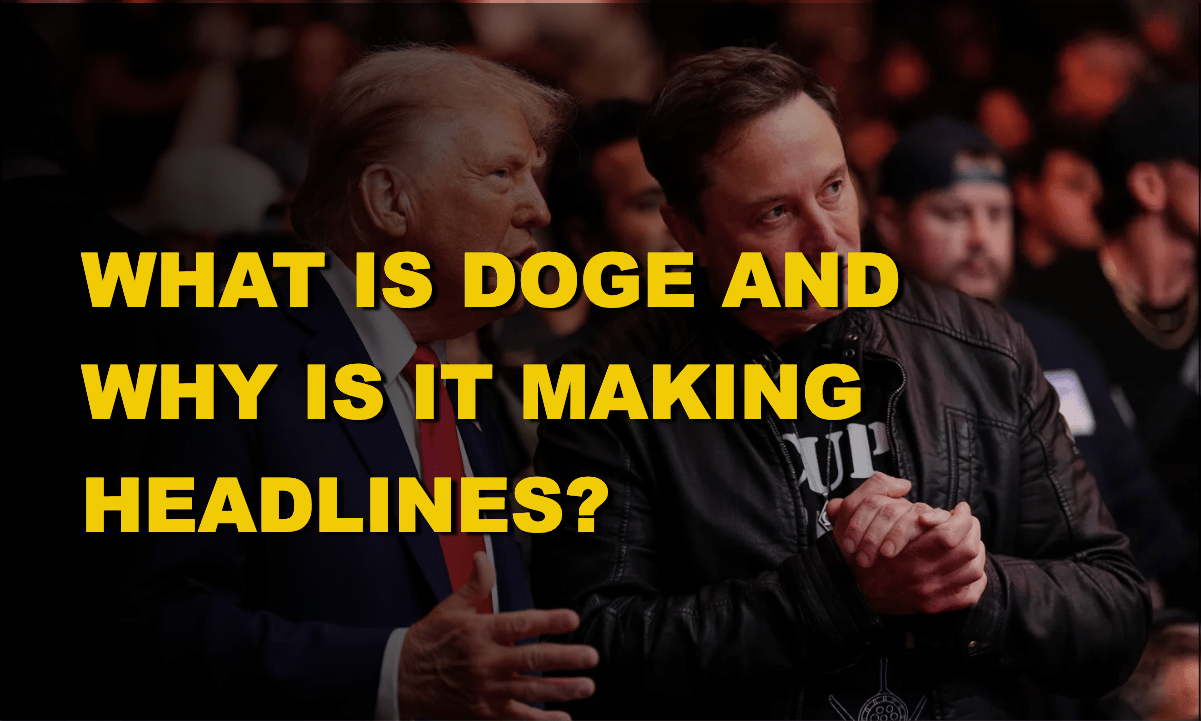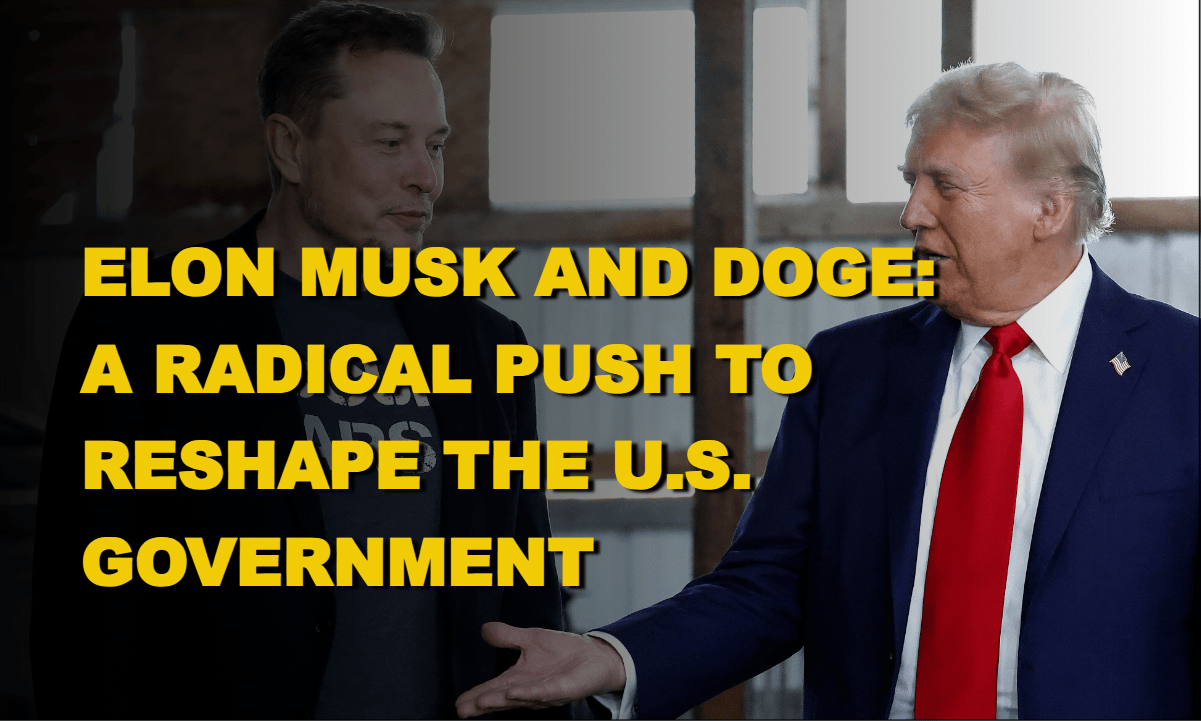Elon Musk, the world’s richest man and CEO of Tesla and SpaceX, has stepped into the realm of U.S. government reform with a bold new initiative: the Department of Government Efficiency (DOGE). Spearheaded by Musk and supported by President Donald Trump, DOGE is a controversial effort to drastically cut costs, streamline government functions, and possibly dismantle agencies like the U.S. Agency for International Development (USAID).
What is DOGE and Why is It Making Headlines?

The Department of Government Efficiency (DOGE) is not a traditional government agency but a special team operating under the White House. With Musk at the helm, DOGE’s mission is to cut government spending, eliminate inefficiencies, and overhaul large federal agencies. Despite the playful name, DOGE is taking serious steps to affect how the U.S. government operates, and it’s already causing a stir.
Musk’s vision of government reform echoes his business philosophy of disruption and cost-cutting. With access to the U.S. Treasury Department’s payment systems, DOGE has the power to influence trillions of dollars in government spending. Additionally, DOGE representatives are reportedly eyeing a complete overhaul of agencies, including the Department of Education and USAID.
USAID in the Crosshairs: The Potential Closure
The U.S. Agency for International Development (USAID), established in 1961 by President John F. Kennedy, has come under intense scrutiny from Musk and Trump’s team. Musk has called USAID a “criminal organization,” alleging corruption and inefficiency within the agency. This rhetoric has sparked heated debates, with critics accusing Musk of making baseless claims and endangering vital foreign aid programs.
Reports suggest that USAID’s website was taken offline as part of the administration’s effort to investigate the agency, with some key personnel placed on administrative leave. With Musk’s push to shut down USAID, global aid programs are at risk, leaving vulnerable populations in countries worldwide concerned about the future of U.S. support.
The Legal and Ethical Concerns of Musk’s Role
Musk’s influence on federal agencies raises several legal and ethical concerns. As a special government employee, Musk’s role in DOGE is temporary, with limits on how long he can serve. However, the extensive access he has gained to government systems—such as classified information at USAID and payment systems at the Treasury—has led to worries about conflict of interest.
Experts have raised alarms over the potential violation of federal ethics laws. Musk’s ownership of major companies like Tesla and SpaceX, which have contracts and dealings with the government, means that his involvement in federal reform could present significant conflicts of interest.
Critics, including former White House ethics officials, have pointed out that Musk’s team could be operating in a “shadow government,” bypassing congressional authority and creating potential legal chaos. As DOGE moves forward with its aggressive cost-cutting measures, the question of whether it is legally allowed to operate without congressional approval remains unresolved.
Public Reaction: The Growing Debate
The public’s reaction to Musk’s government intervention has been intense, with both supporters and critics voicing strong opinions. Some argue that Musk’s approach could streamline a bloated government and eliminate wasteful spending. Others, however, fear the far-reaching consequences of allowing an unelected billionaire to control key aspects of the federal government.
In particular, security experts have raised concerns about the risk of classified information being accessed improperly by DOGE officials, who may not have the appropriate security clearances. Musk himself has denied any improper conduct, stating that all information is accessed through proper channels. However, the lack of transparency and oversight has fueled skepticism.
The Bigger Picture: What Does This Mean for Government Reform?
Musk’s push for drastic changes to the U.S. government could have long-term ramifications. His actions have set the stage for potential legal battles, as federal employees and advocacy groups, including unions and retired government officials, challenge the legality of DOGE’s reach and authority.
Beyond the immediate concerns, Musk’s intervention represents a broader push to reimagine the role of government in the 21st century. With technology and business acumen at the forefront, Musk and Trump are attempting to reshape the federal government in a way that reflects their vision of efficiency and fiscal responsibility.
While the success of DOGE remains uncertain, it has sparked a national conversation about the future of government bureaucracy, transparency, and accountability. Whether this initiative will result in a better, more efficient government—or undermine vital public services—remains to be seen.
Key Takeaways:
- DOGE, led by Elon Musk, is a White House initiative to overhaul U.S. government agencies and cut costs.
- Musk has targeted USAID for potential closure, calling it corrupt and inefficient.
- Legal and ethical concerns surround Musk’s role as a special government employee, with questions about conflict of interest and access to sensitive information.
- Public debate over DOGE’s impact on the federal government is heating up, with supporters calling for reform and critics warning of serious risks.
As the story continues to unfold, DOGE’s actions are sure to remain a topic of intense scrutiny. The world is watching to see how far Musk’s influence will reach and what consequences will arise from this unprecedented government shake-up.
Frequently Asked Questions (FAQ)
1. What is the DOGE initiative led by Elon Musk and Trump?
The DOGE initiative is a cost-cutting and government reform campaign spearheaded by Elon Musk under the direction of President Donald Trump. The initiative focuses on increasing government efficiency, eliminating waste, and reducing unnecessary bureaucracy in federal agencies, with the goal of streamlining operations and improving fiscal responsibility.
2. Why are people concerned about Musk’s involvement in government reform?
Elon Musk’s involvement in the DOGE initiative has raised concerns due to his vast business interests and potential conflicts of interest. Critics argue that Musk, being the CEO of SpaceX and Tesla, may prioritize his business interests over the public good. Additionally, his aggressive approach to government reform has sparked legal questions regarding transparency, security clearances, and authority over sensitive government systems.
3. What does the shutdown of USAID mean for international aid?
USAID (United States Agency for International Development) is responsible for distributing billions in foreign aid to developing nations. The Trump-Musk push to shut down or drastically alter the agency has sparked fears that it could reduce U.S. influence globally, harm international development programs, and hinder humanitarian aid efforts, especially in crisis regions.
4. How is the Department of Government Efficiency (DOGE) different from other government agencies?
Unlike traditional government departments, DOGE operates under the direct oversight of the White House and does not have official Cabinet status. Its mission is to find and eliminate wasteful spending, streamline operations, and challenge bureaucratic inefficiencies. This unorthodox approach has generated debate over its legitimacy and potential legal consequences.
5. What are the potential legal challenges Musk and DOGE might face?
Musk and DOGE could face multiple legal challenges, including accusations of overstepping their authority, conflicts of interest, and violations of federal laws related to government transparency and security. The access granted to DOGE representatives, including classified information and the Treasury’s payment systems, has already led to lawsuits from concerned parties about privacy violations and lack of oversight.

